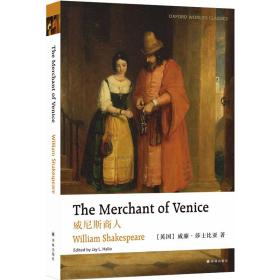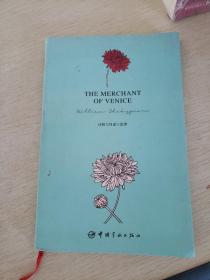
The merchant of Venice
正版全新 可开发票
¥ 14.6 4.6折 ¥ 32 全新
库存17件
作者William Shakespeare
出版社译林出版社
ISBN9787544783088
出版时间2020-08
装帧平装
开本其他
定价32元
货号3526754
上书时间2024-12-26
- 在售商品 暂无
- 平均发货时间 18小时
- 好评率 暂无
- 最新上架
商品详情
- 品相描述:全新
- 商品描述
-
导语摘要
“牛津英文经典”(OxfordWorld’sClassics)为牛津大学出版社百年积淀的精品书系,译林出版社原版引进。除牛津品牌保证的quanwei原著版本之外,每册书附含名家导读、作家简介及年表、词汇解析、文本注释、背景知识拓展、同步阅读导引、版本信息等,特别适合作为大学生和学有余力的中学生英语学习的必读材料。导读者包括牛津和剑桥大学的资深教授、知名学者。整套书选目精良,便携易读,实为亲近名著的经典读本。
《威尼斯商人》是莎士比亚创作于1596—1597年的一部五幕喜剧,1598年首次演出,1600年出版。剧中的高利贷商人夏洛克、乔装律师的鲍西娅已成为经典莎剧角色,优秀演员历来用来挑战、超越自我。时至今日,这部作品蕴含的商业、法律、伦理问题仍然被广泛讨论。
作者简介
威廉•莎士比亚(1564—1616),英国文艺复兴时期伟大的剧作家、诗人,欧洲文艺复兴时期人文主义文学的集大成者,全世界很好的文学家之一。英国戏剧家本•琼森称他为“时代的灵魂”,马克思称他与古希腊的埃斯库罗斯为“人类伟大的戏剧天才”。 莎士比亚流传下来的作品包括38部剧本、154首十四行诗、两首长叙事诗和其他诗作。其中代表作主要为诗剧:《李尔王》《哈姆莱特》《奥赛罗》《罗密欧与朱丽叶》《威尼斯商人》等。他的作品是人文主义文学的杰出代表,在世界文学目前占有重要的地位。他的作品直至今日依旧广受欢迎,在优选以不同文化和政治形式演出和诠释。
目录
威尼斯青年巴萨尼奥为了向富有的鲍西娅求婚, 向朋友安东尼奥借款。由于安东尼奥的资金都投在了海上的货物, 只好向高利贷商人夏洛克借钱。夏洛克长期不满安东尼奥, 于是在借款条约中规定如果安东尼奥不能按时还款, 则要从他身上割下一磅肉。巴萨尼奥求婚顺利, 但是安东尼奥却无力还款, 即将面临生命危险。于是, 鲍西娅乔装为律师, 用精彩的辩护为他们解了围。
内容摘要
《威尼斯商人》是莎士比亚由喜剧转向悲剧创作的重要作品,通过三条戏剧线索的交叉,描绘了资本主义早期商业和社会生活的广阔图景,塑造了鲍西娅、夏洛克等永恒的戏剧形象,自诞生以来一直是莎剧表演的常青佳作。“牛津英文经典”的版本润色、编辑了早期文本,使用现代英语的拼写和标点形式,并配有莎士比亚学者杰.L.哈里欧教授撰写的导读与注释,分析了这部剧作的内容演变、舞台呈现历史等,并配有剧照,是学生、演员、大众读者优选的优良版本。
主编推荐
“牛津英文经典”(Oxford World’s Classics)为牛津大学出版社百年积淀的精品书系,译林出版社原版引进。除牛津品牌保证的quanwei原著版本之外,每册书附含名家导读、作家简介及年表、词汇解析、文本注释、背景知识拓展、同步阅读导引、版本信息等,特别适合作为大学生和学有余力的中学生英语学习的推荐阅读材料。导读者包括牛津和剑桥大学的资深教授、知名学者。整套书选目精良,便携易读,实为亲近名著的经典读本。《威尼斯商人》是莎士比亚创作于1596—1597年的一部五幕喜剧,1598年抢先发售演出,1600年出版。剧中的高利贷商人夏洛克、乔装律师的鲍西娅已成为经典莎剧角色,很好演员历来用来挑战、超越自我。时至今日,这部作品蕴含的商业、法律、伦理问题仍然被广泛讨论。
精彩内容
ANYapproachtounderstandingShakespeare’sTheMerchantofVeniceinevitablyincludesadiscussionofthevexedquestionofitsallegedanti-Semitism.ThisIntroductiontotheplaythereforeconfrontsthequestiondirectly,focusingonthebackgroundagainstwhichtheplaymustbeconsideredandacomparisonwithanotherplayfamous,orinfamous,foritsportrayalofaJew,Marlowe’sTheJewofMalta.FromthenceadiscussionoftheMerchant’smoreimmediatesourcesanditsdatacontinues,followedbyadetailedanalysisoftheplayitself,whichemphasizesitsambiguities,inconsistencies,andinternalcontradictions.Thisdiscussionnaturallyleadsintoasurveyoftheplay’sperformancehistory,particularlyitsrepresentationofthedominantcharacter,Shylock,andthemajorwayshehasbeenportrayed.TheIntroductionconcludeswithadiscussionofthetextandtheeditorialproceduresfollowedinthisedition.ShakespeareandSemitismShakespeare’sattitudetowardJews,especiallyinTheMerchantofVenice,hasbeenthecauseofunendingcontroversy.Recognizingtheproblem,intheStratford-upon-Avonseasonof1987theRoyalShakespeareCompanyperformedTheMerchantofVeniceback-to-backwithaproductionofMarlowe’sTheJewofMalta.TheJewofMalta,playedasaverybroadheroiccomedy,wasevidentlyintendedtocontrastwithShakespeare’splayanddisarmcriticism,suchastheRSChadexperiencedearlier,in1983,withalesssuccessfulproductionofTheMerchant.Toreinforcethestrategy,AntonySher,aSouthAfricanJew,wascastasShylock.Italmostworked,butnotquite.SherwaslargelyasympatheticShylock,withswastikasandotheranti-Semiticslursusedtounderscorethemoney-lenderasvictim;however,thetrailsceneportrayedShylockasextremelybloodthirsty.Interpolatingsomeextra-Shakespearianstagebusiness,borrowedfromthePassoverHaggadah,TheRSCandSherindicatedthatcuttingAntonio’spoundoffleshwastantamounttoareligiousritualofhumansacrifice.Ofcourse,nothingcouldbefurtherfromJewishreligiouspracticeorprinciples,theabortedsacrificeofIsaacinGenesis22beingthearchetypeofJewishoppositiontohumansacrifice.Intheevent,AntonySher’sShylockwasnotfarremovedfromAlunArmstrong’sBarabas.LookingcloselyatbothMarlowe’splayandShakespeare’swillclarifytheattitudestowardsSemitisminthosedramas,butthebackgroundagainstwhichbothwereconceivedisalsoimportant.JewshadbeenofficiallybanishedfromEnglandsincetheExpulsionof1290byKingEdward,buttheevictionwasnotquitethoroughgoingaswashoped.AfewJews,whetherconvertsornot,remainedinEnglandintheinterveningperiodbeforeOliverCromwellinvitedthemtoreturnintheseventeenthcentury.Thereissufficientevidenceforthisassertion,butwhetherShakespeareorMarloweactuallyknewanyJewsmaybeirrelevant.IntheirplaystheywrotenotfrompersonalexperiencebutfromatraditionthathadevolvedbothinEnglandandontheContinentoftheJewasalien,usurer,memberofaracemaudite.InMarlowe’scase,thetraditionoftheamoralmachiavelwasevenmoreimportantthanthatofthemoney-lender.Inthesepost-Holocaustdays,itmaybedifficultforustoconceivehowJewswereregardedandtreatedinEurope,includingEngland,duringtheMiddleAges.Theyhadfewrightsandcouldnotclaiminalienablecitizenshipinanycountry.Typically,theydependeduponrulersoftherealmforprotectionandsuchrightsastheymightenjoy.InthethirteenthcenturyinEngland,forexample,underHenryIIIandEdwardI,theyweretantamounttotheking’schattel.Thekingcould—anddid—disposeofthemandtheirpossessionsentirelyashechose.Heavytalladges,ortaxes,wereimposeduponJews—individuallyandcollectively—tosupportthesovereign’sfinancialneeds,andwhenthemoneyswerenotforthcoming,imprisonmentand/orconfiscationusuallyfollowed.Atthesametime,theChurchvigorouslyopposedtheexistenceofJewsinthecountry,butastheywereundertheking’sprotectiontheChurchwaspowerlesstodomorethanexcitepopularfeelingagainstthem.Contrarytocommonbelief,notallJewsweremoney-lenders,althoughusurywasoneofthefewmeanstoaccumulatesuchwealthastheyhad.ManyJewswerepoorandservedinhumble,evenmenialcapacities.Butasnon-believersinChrist,theywereadespisedpeople,howeveruseful,financiallyandotherwise(asdoctors,forinstance).Neartheendofthirteenthcentury,whenEdwardhadpracticallybankruptedhisJews,whofounditimpossibletomeethisincreasinglyexorbitantdemandsforpayments,thekingdecidedtoplayhislastcard—expulsion.ThisactwasnotsatisfyingtotheChurch,butitprovedthekingwiththelastbitofincomefromthatonceprofitablesource.SinceeverythingtheJewsownedbelongedtotheking,includingthedebtsowedthemasmoney-lendersorpawnbrokers,thekingbecamethebeneficiaryofthosedebtsaswellaseverythingelseofvalue.AlthoughEdwardrelievedthedebtorsoftheinterestontheirloansandmadesomeotherconcessions,hehopedtorealizeasizeableamountofmoneyeventually,howevermuchhemightlaterregretthetermination—forever?–orthisoncelucrativesourceofincome.Doubtless,someJewspreferredconversiontoexpulsioninEngland,aslaterinSpainundertheInquisition,andtheytookshelterintheDomusconversorum,theHouseofConverts.ThisinstitutiondatesfromtheearlythirteenthcenturyandwasaneffortbytheDominicans,assistedbytheking,toconverttheJewstoChristianity.TheDomusconversoruminwhatisnowChanceryLaneinLondonlastedwellintotheeighteenthcentury.AlthoughattimesfewifanyconvertsofJewishbirthlivedthere,inthecenturiesfollowing1290itshelteredseveralfromExeter,Oxford,Woodstock,Northampton,BuryStEdmunds,Norwich,Bristol,aswellasLondonandelsewherewhereJewshadlivedbeforebeingexpelled.AftertheExpulsion,someJewsenteredtherealmforonereasonoranother,eitherastravelersandmerchants,asrefugeesfromSpainandPortugal.
媒体评论
他创造的思想和美如此广受传播而俯拾即是,令人出于本能与之亲近。——简•奥斯汀他不只属于一个时代,而属于全世纪。——本•琼森
相关推荐
-

The Merchant of Venice
九品北京
¥ 36.00
-

THE MERCHANT OF VENICE
六五品运城
¥ 3.00
-

THE MERCHANT OF VENICE
六五品嘉兴
¥ 3.00
-

The Merchant of Venice
全新保定
¥ 12.50
-

The merchant of Venice
全新武汉
¥ 13.44
-

The Merchant of Venice
九品天津
¥ 5.88
-

THE MERCHANT OF VENICE
九五品安庆
¥ 8.00
-

The Merchant of Venice
八五品长沙
¥ 8.00
-

The Merchant of Venice
八五品长沙
¥ 10.00
-

The Merchant of Venice
九品杭州
¥ 5.00
— 没有更多了 —













以下为对购买帮助不大的评价